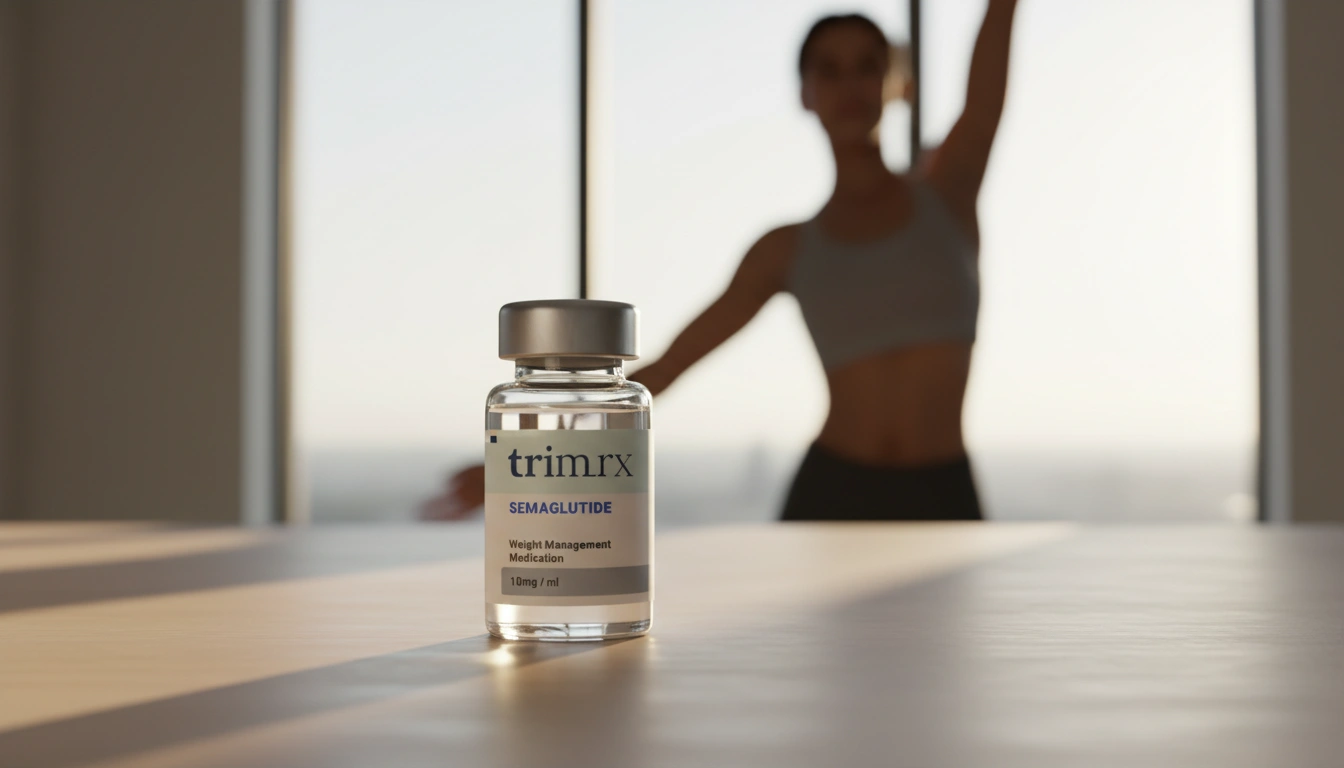Why Did I Gain Weight on Semaglutide? Understanding the Phenomenon

Introduction
In a world where effective weight management remains a pressing health concern, many individuals turn to medications like semaglutide for assistance. Semaglutide, a glucagon-like peptide-1 (GLP-1) receptor agonist, has gained significant attention in recent years for its role in aiding weight loss and managing type 2 diabetes. While many report positive outcomes, some individuals experience an unexpected weight gain while using semaglutide. This paradox can be perplexing and disheartening.
So, why do some people gain weight on semaglutide? In this blog post, we will explore the underlying factors that contribute to this phenomenon, discuss the importance of lifestyle modifications, and emphasize our commitment at TrimRx to provide personalized, medically supervised weight loss solutions. By the end of this article, you’ll have a clearer understanding of the mechanisms at play and actionable insights to help maintain your weight loss journey.
Consider this: a significant portion of the U.S. population struggles with obesity and its associated health conditions, affecting nearly 42% of adults, according to the CDC. As weight management becomes a critical public health issue, medications like semaglutide have emerged as viable tools to assist individuals on their weight loss journeys. Semaglutide mimics a naturally occurring hormone in the body, helping to regulate appetite, improve insulin sensitivity, and promote feelings of fullness.
However, despite these benefits, some individuals find themselves gaining weight while on semaglutide. This blog post aims to unravel the complexities behind why this occurs, the biological and lifestyle factors involved, and how we at TrimRx can support your weight loss goals through personalized, medically supervised care.
We will delve into the following aspects:
- The mechanisms of semaglutide and its role in weight management.
- Factors that may contribute to weight gain while on semaglutide.
- The significance of lifestyle changes for maintaining weight loss.
- How TrimRx’s personalized programs can help you achieve sustainable results.
By understanding these elements, you can make informed decisions about your weight loss journey and effectively manage your health.
The Mechanisms of Semaglutide
What is Semaglutide?
Semaglutide is a synthetic GLP-1 receptor agonist that plays a critical role in appetite regulation and glucose metabolism. By mimicking the action of the GLP-1 hormone, semaglutide helps to:
- Decrease Appetite: Semaglutide signals the brain to reduce hunger pangs, making it easier for individuals to control their caloric intake.
- Increase Satiety: It enhances feelings of fullness after meals, contributing to reduced food consumption.
- Regulate Blood Sugar Levels: By improving insulin sensitivity, semaglutide aids in the management of blood glucose, which is particularly beneficial for individuals with type 2 diabetes.
These mechanisms collectively contribute to weight loss when semaglutide is used in conjunction with a balanced diet and regular exercise.
How Semaglutide Works in the Body
When we ingest food, GLP-1 is naturally released by the intestines in response to nutrient intake. Semaglutide replicates this action, resulting in several physiological responses:
- Slower Gastric Emptying: Semaglutide slows the rate at which food leaves the stomach, prolonging the sensation of fullness.
- Increased Insulin Secretion: The medication stimulates insulin production when blood sugar levels are elevated, assisting in glucose management.
- Decreased Glucagon Release: By lowering glucagon (a hormone that raises blood sugar), semaglutide further supports glucose regulation.
These combined effects create a favorable environment for weight loss. However, when the medication is stopped or not complemented with lifestyle changes, individuals may face challenges in maintaining their progress.
Factors Contributing to Weight Gain on Semaglutide
1. Inadequate Dosage
One of the reasons people may experience weight gain on semaglutide is due to an inadequate dosage. The initial dose of semaglutide is often low to minimize side effects. If the dosage is not adequately adjusted over time, it may not produce the desired appetite-suppressing effects, leading to continued weight gain or stalled weight loss.
At TrimRx, we emphasize the importance of personalized treatment plans. Our free assessment quiz helps determine the appropriate medication and dosage tailored to your unique needs. Take our free assessment quiz here.
2. Caloric Intake Outpacing Appetite Suppression
While semaglutide effectively reduces appetite, it doesn’t guarantee a significant drop in caloric intake. Some individuals may still consume high-calorie foods or large portions, counteracting the medication’s benefits.
To achieve lasting weight loss, it is crucial to focus on a balanced diet rich in whole foods, lean proteins, and fiber. By making small, sustainable changes to your eating habits, you can maximize semaglutide’s weight loss effects. For additional support, consider our GLP-1 Daily Support and Weight Loss Boost supplements to enhance your weight loss journey.
3. Insulin Resistance and Hormonal Factors
For individuals with insulin resistance or hormonal imbalances, weight loss can be particularly challenging, even with medications like semaglutide. Insulin resistance can promote fat storage and hinder weight loss efforts.
It is essential to address these underlying issues through comprehensive lifestyle changes, including dietary adjustments, regular exercise, and possibly consulting with healthcare professionals for additional support. At TrimRx, we provide personalized consultations and ongoing support to help you navigate these challenges effectively.
4. Missed or Irregular Dosing
Consistency is key to achieving optimal results with semaglutide. Missing doses or taking them irregularly can lead to fluctuations in blood sugar and appetite regulation, making it difficult to maintain weight loss.
To prevent this, we recommend setting reminders or using medication trackers to ensure you stay on schedule. Our platform offers ongoing support to help you navigate your treatment plan effectively.
5. Sedentary Lifestyle
Physical inactivity can significantly impede weight loss efforts, even with the support of semaglutide. Regular exercise not only burns calories but also improves insulin sensitivity and overall metabolic health.
The CDC recommends at least 150 minutes of moderate-intensity aerobic activity each week, along with strength training exercises. By incorporating physical activity into your routine, you can enhance the effectiveness of semaglutide and promote sustainable weight loss.
The Significance of Lifestyle Changes
Diet and Nutrition
While semaglutide can aid in appetite suppression, it is not a replacement for a healthy diet. Engaging in mindful eating practices, portion control, and choosing nutrient-dense foods can dramatically improve weight loss outcomes.
Consider planning your meals in advance, focusing on whole foods, and avoiding highly processed items. This proactive approach helps ensure that your caloric intake aligns with your weight loss goals.
Physical Activity
Exercise plays a vital role in weight management. Not only does it help burn calories, but it also boosts your metabolism, improves mood, and enhances overall well-being.
At TrimRx, we encourage individuals to find activities they enjoy, whether it’s walking, jogging, swimming, or group classes. Building a consistent exercise routine can lead to long-term success.
Mental and Emotional Support
Weight loss journeys are often accompanied by emotional challenges. Stress, anxiety, and depression can impact your motivation and ability to maintain healthy habits.
We believe in addressing the whole person at TrimRx. Our programs incorporate mental wellness support, helping you develop strategies to manage stress and emotional eating effectively.
How TrimRx Can Support Your Weight Loss Journey
At TrimRx, our mission is to empower individuals on their weight loss journeys through personalized, evidence-based care. We combine advanced medical science with compassionate support to help you achieve sustainable results.
Personalized Assessment
Our free assessment quiz is designed to identify your unique needs and determine eligibility for our prescription weight loss medications. By understanding your individual circumstances, we can create a tailored treatment plan that aligns with your goals.
Take our free assessment quiz here.
Comprehensive Support
Our comprehensive service includes doctor consultations, medication management, lab work, and unlimited support. We prioritize transparency and safety by partnering only with FDA-registered and inspected pharmacies for medication shipping.
Ongoing Education and Resources
We believe that knowledge is power. Our platform offers a wealth of resources to educate you on nutrition, exercise, and emotional well-being. By staying informed, you can make empowered decisions that enhance your weight loss journey.
Conclusion
Understanding why some individuals gain weight on semaglutide is essential for navigating the complexities of weight management. Factors such as inadequate dosing, caloric intake, insulin resistance, missed doses, and a sedentary lifestyle can all contribute to this phenomenon.
At TrimRx, we are committed to helping you achieve your weight loss goals through personalized, medically supervised care. By focusing on sustainable lifestyle changes and incorporating our comprehensive support, you can effectively manage your weight and enhance your overall well-being.
If you’re ready to take the next step in your weight loss journey, consider taking our free assessment quiz today. Together, we can create a plan that works for you.
FAQ
Can semaglutide cause weight gain?
While semaglutide is effective for weight loss, some individuals may experience weight gain due to factors such as inadequate dosage, poor dietary habits, or hormonal imbalances.
How can I prevent weight gain while using semaglutide?
To prevent weight gain, focus on maintaining a balanced diet, engaging in regular physical activity, and adhering to your prescribed medication schedule.
What should I do if I gain weight on semaglutide?
If you experience weight gain while on semaglutide, consult your healthcare provider to assess your treatment plan and discuss any necessary adjustments.
Are there lifestyle changes that can enhance the effectiveness of semaglutide?
Yes, adopting a healthy diet, increasing physical activity, and managing stress can significantly enhance the effectiveness of semaglutide in promoting weight loss.
How can TrimRx help me with my weight loss journey?
At TrimRx, we offer personalized assessments, comprehensive support, and a wealth of educational resources to empower you on your weight loss journey. Together, we can achieve sustainable results.

Transforming Lives, One Step at a Time
Keep reading
Compounded Semaglutide Cost: Complete Pricing Guide 2026
You’ve learned that brand-name Ozempic costs nearly $1,000 per month, and you’ve heard that compounded semaglutide offers the same active ingredient at a fraction…
Understanding Low-Dose Semaglutide: A Gentle Start to Your Weight Loss Journey
Curious about what is a low dose of semaglutide for weight loss? Discover its importance for a safe start & how it minimizes side effects. Learn more!
Understanding Semaglutide Dosing: What is the Maximum Dose of Semaglutide for Effective Weight Management?
Curious about what is the maximum dose of semaglutide? Discover approved dosages for diabetes & weight loss, titration schedules, and safety. Get your personalized plan today!



